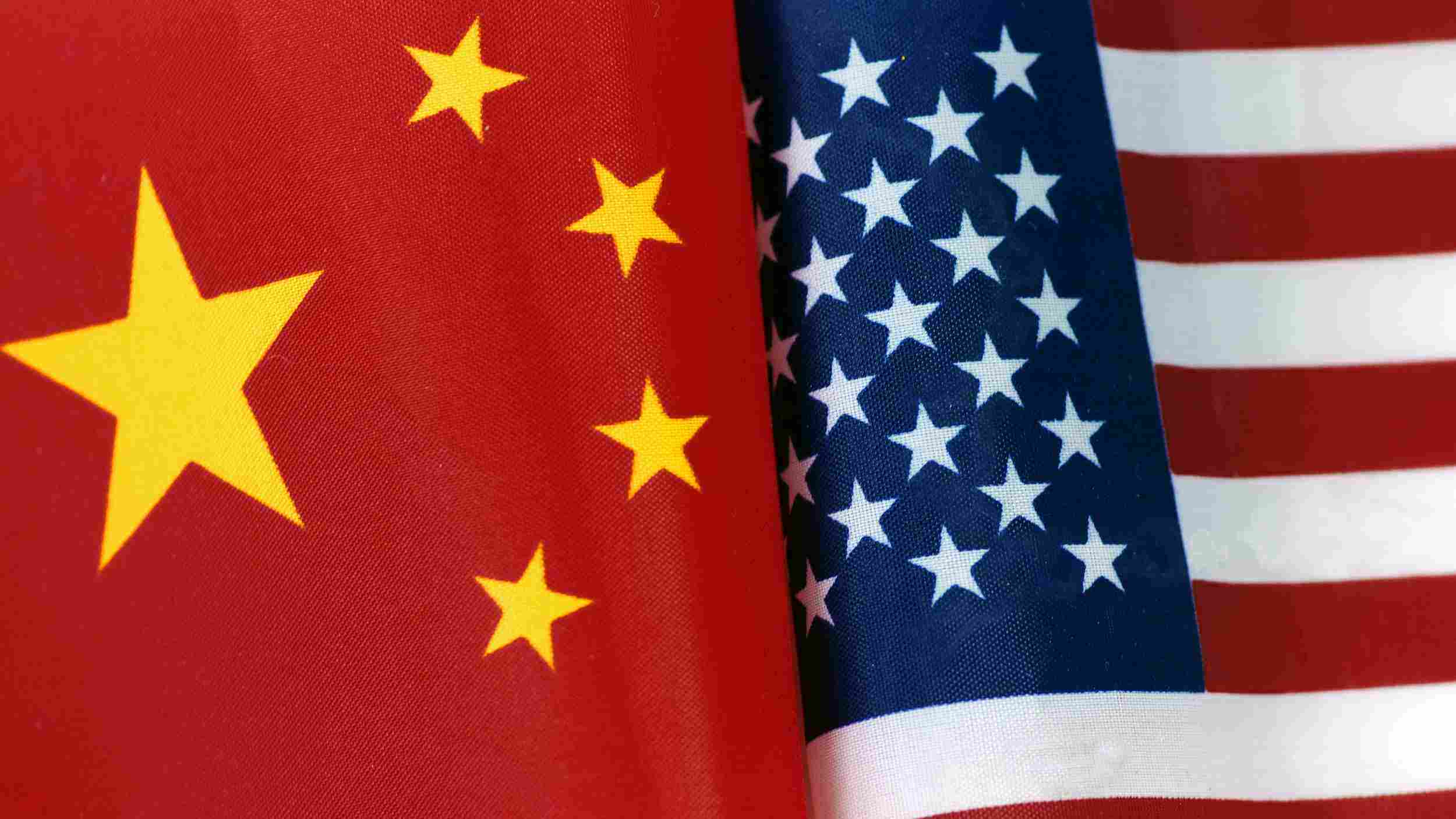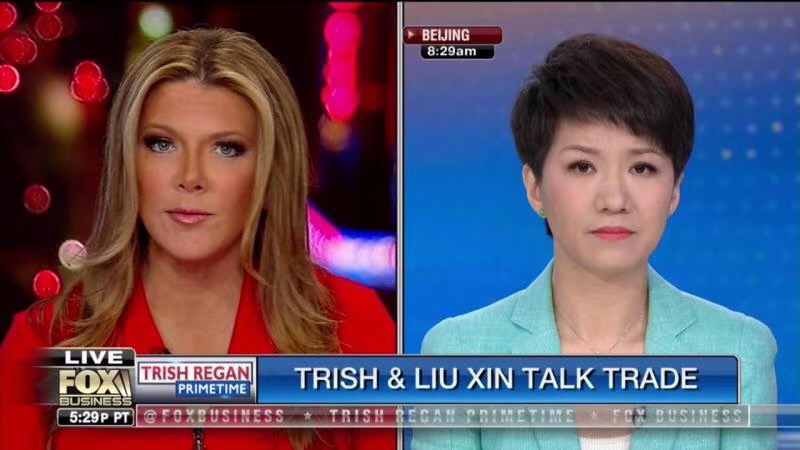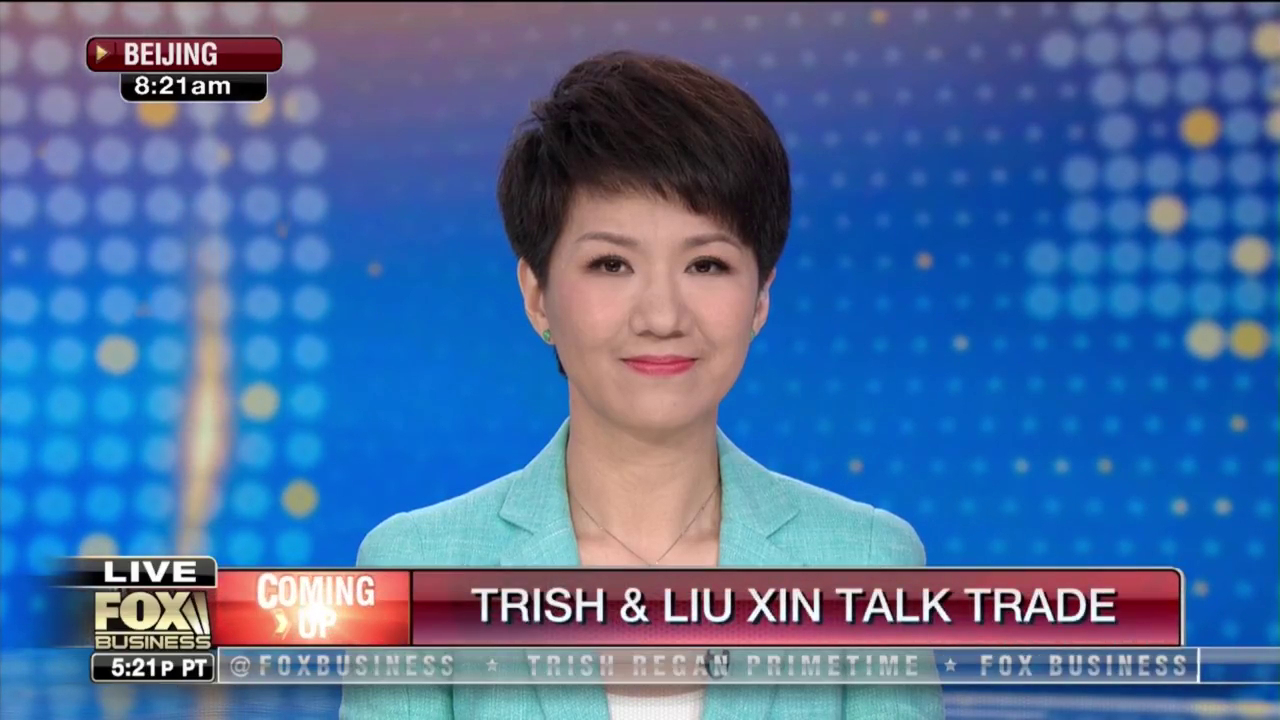
Opinion
21:05, 30-May-2019
Could the impasse start to be broken by this dialogue?
Jia Wenshan

Editor's note: Jia Wenshan is a PhD and professor at Chapman University, and a research fellow at the National Academy for Development and Strategies, Renmin University of China. The article reflects the author's opinion, and not necessarily the views of CGTN.
Since U.S. President Trump's tweet to announce that the U.S. would raise tariffs from 10 to 25 percent on Chinese goods exported to the U.S. on the first weekend of May 2019, China-U.S. trade negotiations have descended into a virtual impasse.
An interview conducted by Fox Business Network Primetime news anchor Trish Regan with Liu Xin, a CGTN host of the program “The Point with Liu Xin,” took place on the morning of May 30, 2019, Beijing Time.
This "face-to-face" interview between the two news anchors was the first in the history of China-U.S. relations and seems to have cracked open a ray of light in the impasse of the China-U.S. trade talks for the global society, which is acutely aware of the unprecedented level of global interdependence among countries, particularly between China and the U.S., and believes that win-win dialogue and cooperation is the only solution for China-U.S. trade relations. Here is why.
A collaborative learning session
Though the exchanges between Liu Xin and Trish Regan before the debate on social media were mostly heated and mutually accusatory in tone, with Regan lodging groundless accusations against China and Liu Xin confronting Regan for her groundless bashing about China as a response, the original frame of a debate prompted by the exchange seems to have turned out to be more of a dialogue than a debate, or even a discussion.

A screenshot of the debate.
A screenshot of the debate.
During the 18-minute long conversation, the two anchors mostly performed a Q & A session as Regan asked a series of questions about China-U.S. trade relations. Though these pointed questions were raised with a clear agenda in mind in an accusatory undertone, to quite an extent, they reflect Regan's willingness and in extension perhaps Regan's fans to be informed and educated about China and China-U.S. trade war by her Chinese counterpart, Liu Xin.
Liu Xin, on the other hand, appeared to be informative in a professional, assertive and courteous manner. The interview concluded with the two affirming the necessity for remaining open and maintaining free trade for mutual prosperity.
A fresh case of dialogic journalism
The session sounded like more of a conversation than a debate, more of a dialogue than a monologue. Both used the tag question technique, a relational and inclusive skill of interpersonal communication.
Liu Xin even invited Trish to visit CGTN and Beijing in the future and offered to show her around at the close of the session. In retrospect, Regan demonstrated a conciliatory communication style, an obvious break from her sharply aggressive style, a kind of mudslinging which she had used in groundlessly bashing China in her earlier show.

CGTN host Liu Xin (L) and Fox Business Network Primetime news anchor Trish Regan.
CGTN host Liu Xin (L) and Fox Business Network Primetime news anchor Trish Regan.
It is this kind of mudslinging against China, which Liu had sharply criticized on social media, that grabbed the attention of Regan, who subsequently invited Liu to her show via satellite from Beijing. As reported by The New York Times right after the show, Liu accepted Regan's invitation with a condition that there would be no mudslinging by Regan when she appeared on the show.
Obviously, Regan not only accepted the condition but also followed it through. During most of the session, both Trish and Liu listened to each other, a very important skill which is often underused by American news anchors, particularly those from Fox News.
Implications for China-U.S. relations
For too long, too few such dialogues between Chinese and U.S. media have occurred despite the fact that the two countries have found each other increasingly interdependent.
The knowledge and information each people have about each other are far from compatible from the degree of mutual interdependence and are far from being enough to make both parties competent in making a correct judgment about each other and in effectively interacting with each other for mutual gain.
Not only is each ethnocentric, but also each nation's media tend to have fanned such ethnocentrism among its own people, particularly the American media exemplified by Fox Network. This may explain why Trish Regan was confronted by Liu Xin in the first place.

A screenshot of the debate.
A screenshot of the debate.
It is highly hoped that the Regan-Liu Dialogue will continue and multiply in many creative forms between China and the U.S. to not only narrow knowledge gaps of both the American and Chinese media professionals about each other's country, but better inform both countries' public and elites and the global society so that China-U.S. relations and global society would not drift apart.
Lessons to be learned
First of all, do not keep silent when one's counterpart has wronged oneself. Speak up and pick a fight with the right person at the right time in the right place in the right manner. This would result in mutual relational maintenance and realignment.
Do not wait till reaching the last straw, and face challenges. This is especially necessary for Chinese who tend to be concerned when interacting with big powers such as the U.S.
Besides, for the U.S. side, learning to be reflective and humble is very necessary as American culture is self-oriented and tends to view themselves as highly individualistic and goal-oriented superheroes so that they intend to consequentially ignore or downplay their counterparts' perspectives, concerns, needs and core interests.
(If you want to contribute and have specific expertise, please contact us at opinions@cgtn.com.)

SITEMAP
Copyright © 2018 CGTN. Beijing ICP prepared NO.16065310-3
Copyright © 2018 CGTN. Beijing ICP prepared NO.16065310-3